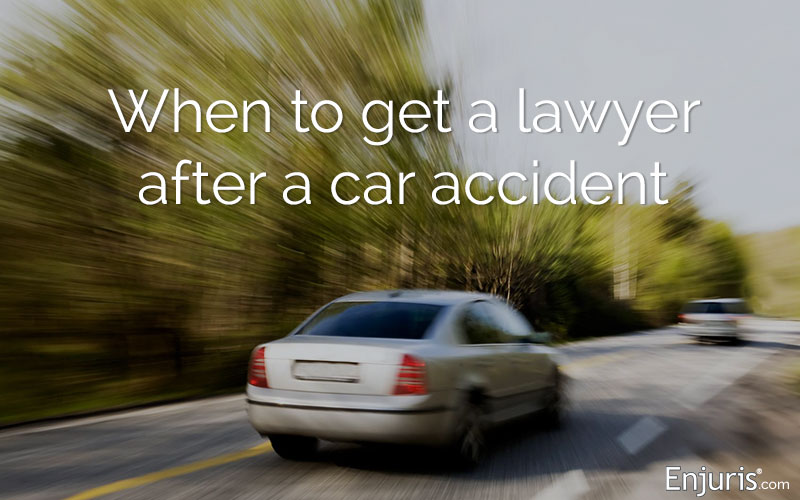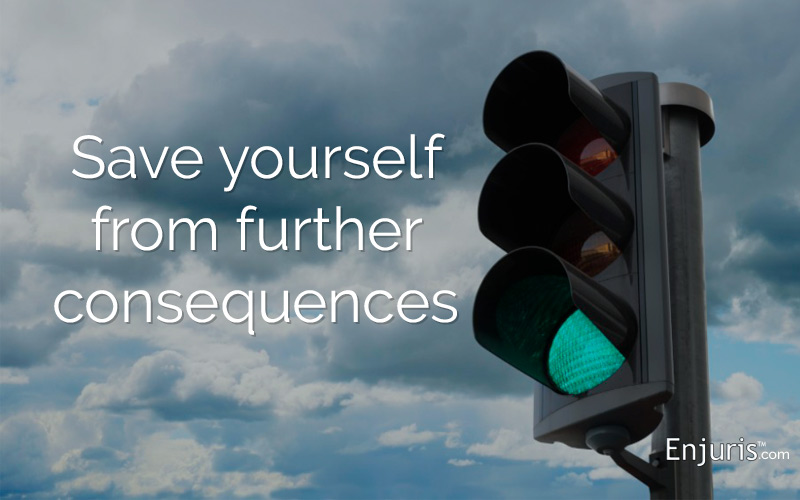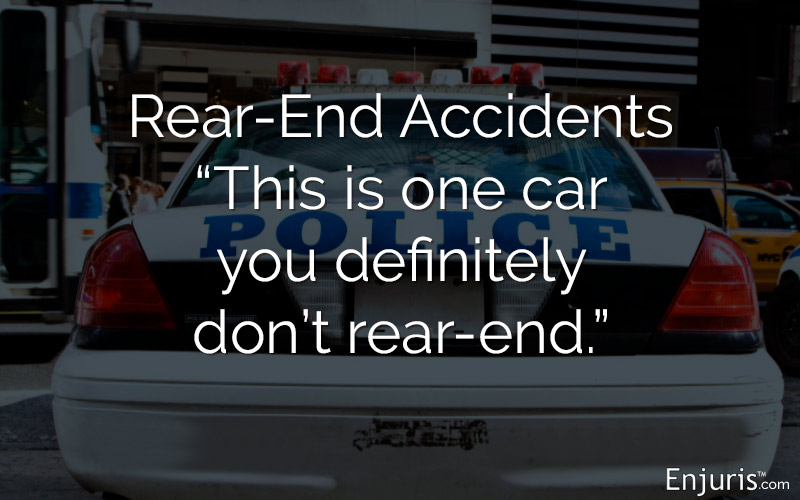What to do after a car crash in Gainesville, FL
Gainesville is known as one of the best places to live in Florida, according to rankings based on quality of life, schools, nightlife, diversity, things to do, and other livability metrics. (source)
If you live in "The Swamp," you probably already know that it's a lovely community in the heart of Alachua County. And, while Gainesville doesn't see a tremendous number of inbound commuters compared to other Florida cities, there are always visitors — many of whom are there to study or work at the University of Florida, which employs more than 27,000 people.
Like any community — large or small — where there are people who drive cars, there are going to be car accidents or tragically, fatal crashes. Gainesville, with a population of 132,127, is no exception.

Gainesville, Florida car accident statistics
Car accidents can happen just about anywhere, whether it's in your local supermarket parking lot or on a major highway. But fatalities are more likely at intersections or on high-speed roadways.
Gainesville city streets are on a numbered grid, with the exception of Waldo Road (State Road 24), Hawthorne Road (SR 20), Williston Road (SR 121/331), Archer Road (SR 24), and Newberry Road (SR 26).
|
Main roads through Gainesville, Florida
|
|
|---|---|
| Road | Route |
| I-75 | Northwest and southeast across the western edge of Gainesville; interchanges at SR 121/SR331 at exit 382, SR 24 at exit 384, and SR 222 at exit 390 |
| US 441 | Local north/south route through Gainesville, along the eastern edge of University of Florida campus (also called 13th street); joins SR 20 |
| SR 20 (Hawthorne Road) | Northwest and southwest through Gainesville, becoming a standalone 4-lane highway toward Hawthorne, Interlachen and Palatka; it also connects with US 27 toward Fort White, Branford, Mayo, Perry and Tallahassee |
| SR 24 (Waldo Road) | From Gainesville Regional Airport in the northeast corner to Waldo, Starke, and Jacksonville. |
| SR 26 (Newberry Road) | Local east-west route from Fanning Springs to Trenton, Newberry, and Jonesville before ending in Putnam County. |
| SR 120 | East/west through the city from SR 24 to US 441. |
| SR 121 (Williston Road) | North/south on the western side of Gainesville to Lake Butler, Raiford, and Macclenny, and south to Williston and Lebanon Station. |
| SR 222 | Northern north/south route from I-75 toward SR 26 near the airport. |
| SR 331 (Williston Road) | Northeast and southwest through Gainesville, this is a truck route for many state roads and runs north/south as a 4-lane divided highway outside the city limits. |
Here's a look at car accident fatality statistics in Gainesville in recent years:
Most dangerous intersections in Gainesville
Data show that based on crashes, crash severity and crash rates, these are the most dangerous Gainesville-area intersections:
- NW 34th Street & NW 39th Avenue
- West University Avenue & NW 22nd Street
- SW Archer Road and the north Interstate 75 on and off-ramps
- SW Archer Road and SW 37th Boulevard
- West University Avenue and NW 22nd Street
- SW 20th Avenue and SW 62nd Blvd / SW 52nd St
- SW 16th Avenue and SW 13th Street
- SW 34th Street and SW 20th Avenue
- SW 13th Street and SW Williston Road
- SW Archer Road and the south I-75 on and off-ramps
- SW 40th Boulevard and SW Archer Road
- Newberry Road and NW 75th Street
Numbers 10, 11, and 12 on this list were tied for the number of crashes. (source)
Do you want to talk to a personal injury attorney?
If you have questions about your case, the best thing you can do is speak with an experienced lawyer near you who will review your claim and explain what to do next.
Read our complete guide to finding the right injury attorney for your case. Read insights from Enjuris attorneys and lawyers across the USA on when and why you need to hire a car accident attorney. Learn more
What to do after a car accident in Gainesville (7 steps)
1. Stop.
Florida law requires you to stop at the scene of any collision, no matter how minor. Failure to pull over and provide your contact and insurance information at the scene can result in criminal hit-and-run charges. As soon as it is safe to do so, you should pull your car off the road and out of traffic.
2. Call 911.
It's always a good idea to call the police when a collision occurs. A police report serves as valuable evidence that can be helpful to your insurance claim or lawsuit. You could also call the Gainesville non-emergency dispatch at (352) 955-1818 if you would like a police report but neither you nor anyone else requires medical attention.
Even if you know or think you're at fault, a police report can still help you. How? A plaintiff could try to claim that they were more injured than they actually were or that their car sustained more damage, but the police report will set forth the facts of the accident exactly as they see it at the crash scene.
It's important to cooperate with police officers. You're not required to make a statement about how the accident happened (and it's probably best if you don't), but you can and should provide factual information like your name, address, vehicle registration, and those types of answers when asked.
3. Seek medical attention.
Even if you don't feel injured, visit a doctor or hospital anyway as soon as possible following a collision. Some car accident injuries like whiplash and head injuries could have symptoms that don't appear until days or weeks after the accident. If you don't have an immediate medical assessment of your condition, it can be difficult to prove that a later symptom is related to the accident.
4. Obtain witness information.
Immediately after a crash, you don't need to gather witness statements. But it is important to be able to reach those people later. A well-meaning bystander might wait to make sure help has arrived or see if everyone is okay and then leave the scene, figuring there's no reason to stick around. But if anyone at the scene observed the accident — or the period leading up to it — they might have valuable information that can help with your case. Write down each person's name, phone number, email address, and residence address if possible.
You might also check to see if any surveillance cameras captured the crash on video. Many businesses and residences are equipped with cameras. If the accident happened somewhere that's close to a business or home, you might be able to recover that footage. But be quick — most businesses will delete camera footage within a short time if they don't think there's a reason to save it. If you think there might be worthwhile information there, notify the business or homeowner right away so the footage from that time period can be saved.
5. Take photos.
Yes, a police report is important, but you've probably heard the phrase "a photo is worth a thousand words." If you're not injured and are able to do so safely, take photos of the scene. Take pictures of the weather, any traffic signs or signals, the vehicles involved, other property damage, road markings, and anything else that might tell a story about how the accident happened and its aftermath.
6. Call your insurance company.
A report isn't the same as a claim. You don't have to decide on the spot if you're going to file a claim or not (you might decide to pay out of pocket, for example). But if you don't make a report immediately, you could lose the option to file a claim in the future if you decide that you want to. Many insurance companies have strict time limits on when you need to report the accident, whether or not you intend to file a claim. You only need to give them the basic information about the accident in order for it to be reported.
7. Contact a Gainesville car accident lawyer.
A common mistake drivers make is thinking that their insurance company is motivated to help them. An insurance company makes a profit when the amounts it pays out as damage settlements are less than what it earns in premium payments. Therefore, the insurance adjuster's job is to make you a settlement offer that's the lowest amount possible that you'll accept in order to close your claim. The agent on the phone might seem nice and sympathetic, but your best interest is not their priority.
There are 2 main reasons to contact a personal injury lawyer:
- The settlement being offered by the insurance company is insufficient to cover your damage costs.
- You have ongoing medical treatments and future expenses associated with the accident.
Your lawyer is motivated to get you the highest possible settlement or verdict for your accident injuries. Your attorney will review every piece of evidence and consult with medical, financial, actuarial, and other experts in order to minimize your liability and maximize your compensation for an accident.
Additional resources
Refer to this list of free printable documents to help organize your needs after a car accident:
What compensation (damages) can Gainesville crash victims receive?
Economic damages
Economic damages are intended to compensate victims for losses with a specific monetary value, including:
- Medical treatment (doctor and hospital visits, surgeries, prescription medication, X-rays and other diagnostics, assistive devices, etc.)
- Rehabilitative therapies (physical, speech, occupational)
- Assistance with daily life activities (housekeeping, childcare, etc.)
- Lost wages
Non-economic damages
Economic damages do not cover damages for emotional distress, pain and suffering, mental anguish, post-traumatic stress disorder (PTSD), loss of consortium, or similar injuries. Rather, these types of damages are considered non-economic since they do not have an easily calculated monetary value.
How long do I have to file a car crash injury claim in Gainesville?
You have 4 years from the date of the accident to file a lawsuit for a car accident injury in Florida. This is called the "statute of limitations." If you don't file your lawsuit within that time, the court will likely refuse to hear your case.
Common causes of car accidents
There are reasons why some intersections are more dangerous than others — sometimes, it's because of confusing signage, lower visibility, or road designs that are difficult to navigate unless the drivers are very familiar with the area. It could also be because intersections with a higher volume of traffic are statistically more likely to have a higher number of collisions.
But many car accidents are preventable.
These are the 10 most common causes of car accidents:
- Distracted driving. Drivers are increasingly dependent on cell phones for maps, podcasts, music, traffic reports, and other functions. However, mobile phones are not the only cause of distracted driving accidents. Distractions can also include eating, passenger behavior, personal grooming, or any other behavior that takes your mind, eyes or hands off driving. It's crucial that you're always paying attention to driving when you're behind the wheel — and that it's the only thing you're doing.
Distracted Driving Accidents in Florida
- Drunk driving. You may not drive if your blood alcohol content (BAC) is 0.08% or higher. Being under the influence of alcohol, drugs, or some medications can severely affect your driving and raises your risk of causing an accident. Even if you're below the legal threshold for intoxication, it can be unsafe to drive with any amount of alcohol or drugs in your body. The best strategy is that if you've been drinking, find another ride like Uber, Lyft, a taxi, or a friend.
Florida DUI Laws, Penalties & Damages After an Accident
- Aggressive driving. "Road rage" is when a driver gets so angry at another person that they might bully or physically harm them. Certainly, road rage can lead to injuries, even if they are not the direct result of a car accident or collision. But aggressive driving also includes general speeding, swerving, and impatience that isn't directed at a specific person.
Road Rage in America: Consequences, Causes & Possible Solutions
- Speeding. Sometimes speeding is aggressive, and sometimes it is just carelessness. Speeding doesn't get you to your destination any faster if you crash or get a ticket. And when you speed, you have less time to react to a traffic situation in front of you and less time to stop if necessary.
What to Do if You Cause a Car Accident
- Reckless driving. Similar to aggressive driving, reckless driving is any kind of action behind the wheel that's unsafe. It might be speeding, weaving, dodging other cars, failure to stop at lights or stop signs, or any other number of reckless driving practices that break road rules or are unsafe.
Careless Drivers Cause Major Trauma Even in Minor Car Accidents
- Inexperienced drivers. You might have just sent your child off to college at the University of Florida, Santa Fe College or City College Gainesville thinking they're "grown and flown," but a college student who is still a young adult has only been driving for a few years. That lack of experience could cause even the most careful driver to misjudge the speed of an oncoming car, poorly execute a turn, or make another mistake that results in an accident. And, some young drivers are more likely than a more experienced driver to take risks. Statistically, young male drivers are most likely to make risky driving decisions.
75 Students Speak Out on Responsibility for Distracted Driving: Part 1
- Tailgating. Tailgating isn't just a fun thing to do at college football games; it's also when a driver follows too closely behind the driver in front of them. Some tailgating is aggressive, but other times it happens because someone isn't paying attention or simply doesn't see the practice as dangerous. When traveling 55 mph, you should leave 16 car lengths (which is about 243 feet) between your vehicle and the car in front of you. Tailgating is dangerous because when you're too close to another vehicle, you don't have enough time to stop if you need to do so quickly. No car can stop on a dime, even if you react quickly. And, even if you stop very fast, there's no guarantee that the driver behind you will be able to do so. As a result, tailgating can result in chain-reaction accidents.
Rear-End Car Accidents – When You Need a Lawyer
- Weather conditions. When the weather is extreme and visibility is poor, it's best to stay off the roads when you can. But when that's not practical or realistic, exercise caution and drive slowly.
Who’s Liable When Bad Weather Causes a Car Accident in Florida?
- Failure to obey traffic laws. Traffic laws are more than just stopping at red lights. Following the speed limit, staying in your lane, passing bicyclists safely, and yielding to pedestrians are just a few of the many necessary aspects of driving responsibly.
The Most Dangerous Cities for Pedestrians
- Failure to stop at a red light or stop sign. Although stopping for stop signs and traffic lights are part of following traffic rules, they're also among the laws drivers break most often. Even if you think you're driving through a "quiet" intersection, you must stop completely at stop signs and lights.
Florida Red Light Cameras Are Here to Stay (For Now)
In our recent Enjuris Florida Drive Safe Scholarship Contest, we asked students across the nation to tell us about the best piece of advice they’ve ever received about driving safely and avoiding car accidents. Nearly 100 students attending universities all around the country responded. Continue reading
Gainesville car accident laws
The basis of personal injury law — in Gainesville and everywhere in the U.S. — is that when a person is injured as a result of negligence, the plaintiff (injured person) is entitled to be made whole again.
In other words:
You should be able to recover damages (money) to restore you to the financial condition you would be in if the accident hadn't happened.
But precisely how a car accident or other personal injury is handled is largely governed by state law.
Pure comparative negligence
Florida is a pure comparative negligence state, which means the amount you can recover in damages in a car accident is reduced by your percentage of fault. Your car accident attorney is the best person to advise you on your rights and liabilities after a collision.
For instance, perhaps you're in a head-on collision because the driver approaching you from the other direction crossed the center line and hit your car. The court could find that the other driver clearly caused the accident because they were looking at their phone at the time, which is why they lost track of the road and crashed.
However, you might have been driving just 5 miles faster than the speed limit. The court might determine that even though you didn't cause the accident, the fact that you were going faster means you had less time to react when the other driver crossed the center line. If you had been driving the speed limit, you could have had enough time to swerve and avoid the collision.
The court might find that the other driver is 90% at fault for the crash and you were 10% at fault. So in this scenario, if your damages were $100,000, the court would reduce the amount of your recovery by 10% to $90,000.
Florida's no-fault law
In a no-fault state, an injured person would turn to their own auto insurance policy for a claim after an accident, regardless of who was at fault.
All Florida drivers are required to have Personal Injury Protection (PIP) insurance. PIP insurance covers medical treatment and lost wages, and it could include other expenses like childcare and related life expenses that you've incurred as a result of your injuries.
However, if your injuries are severe, permanent, or debilitating, or the costs are more than the amount covered by your PIP policy, you can file a lawsuit to recover the remaining amount of damages.
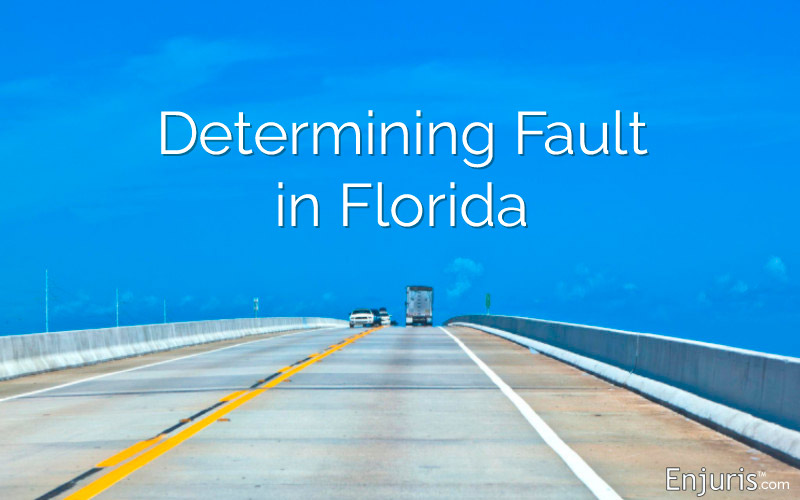
Need a lawyer?
What does an injury lawyer do?
A personal injury lawyer helps individuals who have sustained injuries in accidents to recover financial compensation. These funds are often needed to pay for medical treatment, make up for lost wages and provide compensation for injuries suffered. Sometimes a case that seems simple at first may become more complicated. In these cases, consider hiring an experienced personal injury lawyer. Read more
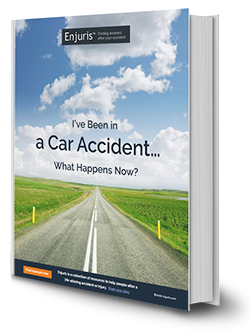

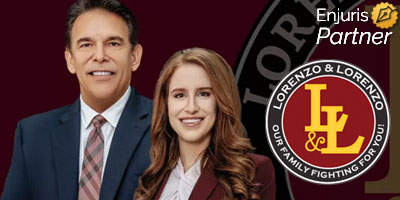
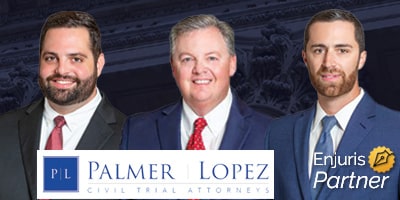
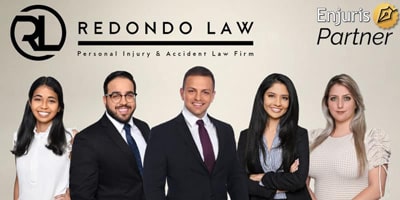
 Source:
Source:  Source:
Source:  Source:
Source: 